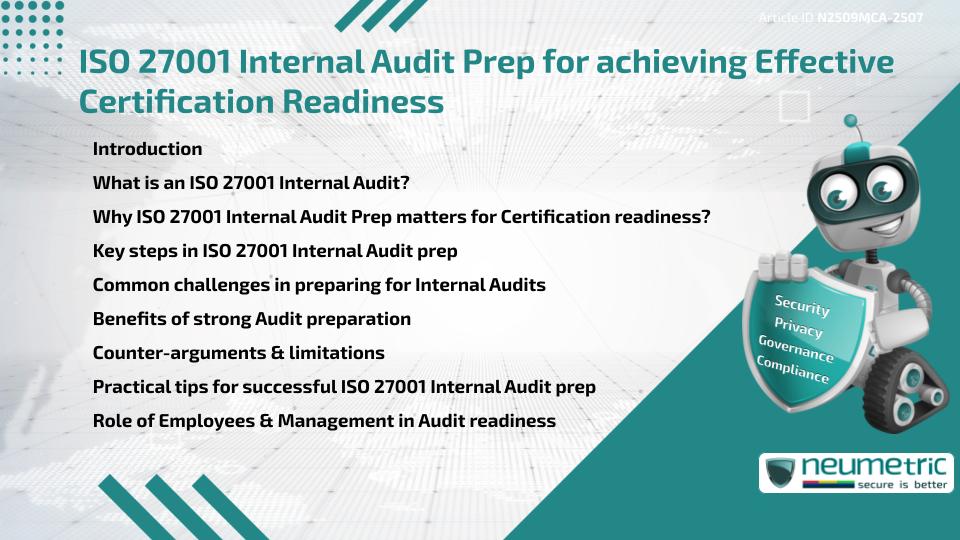Table of Contents
ToggleIntroduction
ISO 27001 Internal Audit Prep is a critical step in achieving effective Certification readiness. Internal Audits verify whether an Organisation’s Information Security Management System [ISMS] aligns with ISO 27001 requirements. Proper preparation ensures Audits run smoothly, Gaps are identified early & External Certification Audits are successful. Without strong prep, Organisations Risk delays, higher Costs & potential Non-Conformities. This article explains what an Internal Audit involves, why preparation is vital, the steps to follow, common challenges & practical tips for success.
What is an ISO 27001 Internal Audit?
An ISO 27001 Internal Audit is a systematic review of an Organisation’s ISMS to confirm Compliance with the standard. Internal Audits assess Policies, Procedures, Controls & Records to verify they are documented, implemented & effective. They serve as a rehearsal for External Certification Audits & are required by the Standard itself. Audits can be conducted by trained Internal Staff or External Auditors, but preparation is essential in both cases.
For details on the purpose of ISO 27001 Audits, see ISO’s official overview.
Why ISO 27001 Internal Audit Prep matters for Certification readiness?
Certification Bodies expect Evidence that Organisations conduct Internal Audits regularly & effectively. Good Prep ensures Findings are meaningful & Corrective Actions are taken before External Auditors review the ISMS. Skipping or underestimating preparation increases the Risk of Non-Conformities, leading to extra costs or even Certification denial. Audit Prep is not just about Compliance-it demonstrates a culture of Accountability & Continuous Improvement.
Key steps in ISO 27001 Internal Audit prep
Effective preparation involves several structured steps:
- Define Scope: Decide which Departments, Systems & Processes will be Audited.
- Review documentation: Ensure Policies, Risk Assessments & Records are up to date.
- Develop an Audit Plan: Outline timelines, objectives & Audit methods.
- Assign responsibilities: Select trained Auditors & clarify their roles.
- Conduct re-Audit checks: Test controls & review past Audit results.
Common challenges in preparing for Internal Audits
Organisations often face difficulties such as incomplete Documentation, limited Auditor expertise & Time constraints. Resistance from Staff who view Audits as disruptive can also hinder preparation. Smaller Organisations may struggle with allocating Resources, while larger ones often find it challenging to coordinate Audits across multiple Departments or Locations.
Benefits of strong Audit preparation
Investing in Audit Prep delivers multiple advantages:
- Identifies weaknesses before External Audits.
- Builds Staff confidence & reduces Audit stress.
- Demonstrates Leadership commitment to Security.
- Enhances efficiency by aligning processes with Best Practices.
- Reduces the Risk of Non-Conformities & Certification delays.
These benefits make ISO 27001 Internal Audit Prep a valuable exercise beyond Compliance.
Counter-arguments & limitations
Some argue that preparing extensively for Internal Audits consumes time & Resources that could be used for other security initiatives. There is also a Risk of Audits becoming a box-ticking exercise if Prep is too rigid. Furthermore, Internal Auditors may lack independence, leading to overlooked issues. While these limitations are valid, they can be managed with Balanced Preparation & by using External Expertise when necessary.
Practical tips for successful ISO 27001 Internal Audit prep
- Schedule Audits well in advance to reduce disruption.
- Train Auditors regularly to improve Competence & Objectivity.
- Use Checklists aligned with ISO 27001 requirements.
- Involve Employees by explaining the purpose & value of Audits.
- Treat Findings as opportunities for improvement, not blame.
These tips make preparation practical, efficient & aligned with long-term Certification goals.
Role of Employees & Management in Audit readiness
Audit readiness is not the responsibility of Auditors alone. Employees play a role by following Policies & Cooperating during Audits. Management must provide Resources, Support & Oversight to ensure success. When both groups engage actively, Internal Audit Prep becomes a collaborative process rather than an isolated task.
Takeaways
- ISO 27001 Internal Audit Prep is essential for Certification readiness.
- Preparation involves Planning, Documentation review & Responsibility allocation.
- Challenges include Resource limits, Staff resistance & Coordination issues.
- Strong Prep delivers benefits such as Efficiency, Trust & Risk reduction.
- Both Employees & Management contribute to effective Audit readiness.
FAQ
What is the purpose of ISO 27001 Internal Audit Prep?
It ensures the ISMS is ready for Internal & External Audits by identifying Gaps & preparing Corrective Actions.
How often should Internal Audits be conducted?
Internal Audits should be conducted at least once a year or more frequently depending on Risk & Business needs.
Who should perform Internal Audits in ISO 27001?
Trained Internal Staff or External Auditors with relevant expertise should carry out Audits, ensuring Objectivity & Competence.
What Documents are essential for ISO 27001 Internal Audit Prep?
Key Documents include Policies, Risk Assessments, Incident Records, Corrective Actions & previous Audit Reports.
Does Internal Audit Prep guarantee Certification success?
No, but it significantly reduces the Likelihood of Non-Conformities during External Audits.
How can Small Organisations handle Audit Prep challenges?
They can use phased Audits, External Consultants for specific areas & Digital Tools for Documentation.
What role does Management play in ISO 27001 Internal Audit Prep?
Management provides Leadership, Resources & Oversight, ensuring the Audit process is well supported.
Need help for Security, Privacy, Governance & VAPT?
Neumetric provides organisations the necessary help to achieve their Cybersecurity, Compliance, Governance, Privacy, Certifications & Pentesting needs.
Organisations & Businesses, specifically those which provide SaaS & AI Solutions in the Fintech, BFSI & other regulated sectors, usually need a Cybersecurity Partner for meeting & maintaining the ongoing Security & Privacy needs & requirements of their Enterprise Clients & Privacy conscious Customers.
SOC 2, ISO 27001, ISO 42001, NIST, HIPAA, HECVAT, EU GDPR are some of the Frameworks that are served by Fusion – a SaaS, multimodular, multitenant, centralised, automated, Cybersecurity & Compliance Management system.
Neumetric also provides Expert Services for technical security which covers VAPT for Web Applications, APIs, iOS & Android Mobile Apps, Security Testing for AWS & other Cloud Environments & Cloud Infrastructure & other similar scopes.
Reach out to us by Email or filling out the Contact Form…


